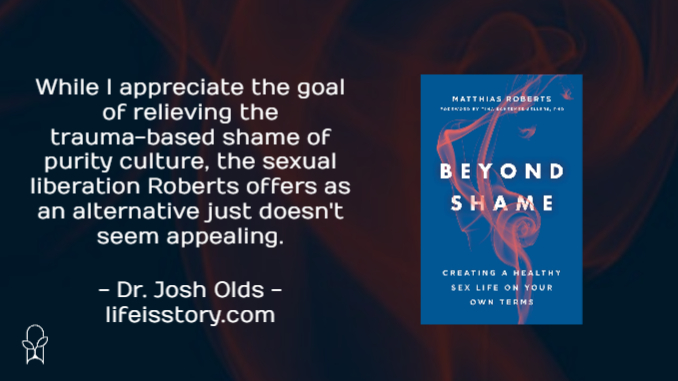
Also by this author: Holy Runaways: Rediscovering Faith After Being Burned by Religion
Published by Fortress Press on January 7, 2020
Genres: LGBTQ+, Non-Fiction, Christian Life
Buy on Amazon
Goodreads

We all carry sexual shame. Whether we grew up in the repressive purity culture of American Evangelical Christianity or not, we've all been taught in subtle and not-so-subtle ways that sex (outside of very specific contexts) is immoral and taboo. Psychotherapist Matthias Roberts helps readers overcome their shame around sex by overcoming three unhealthy coping mechanisms we use to manage that shame. Beyond Shame encourages each of us to determine our own definition of healthy sex, while avoiding the ditches of boundaryless sex positivity on the one hand and strict moralistic boundaries on the other. Define your sexual values on your own terms, overcome your shame, and start having great, healthy sex.
I knew going into this book that it would present me with some challenging viewpoints. I grew up within fundamentalist purity culture and for all that it got wrong and for all the convictions that I’ve changed, I still hold the core belief that sex is for marriage. I had a sneaking suspicion that this book would be a bit more what it would likely term “liberating.” That’s fine. Having seen the destruction of healthy sexuality under the weight of shame that purity culture has wrought, I wanted to see what the other side might look like.
The key area where I disagree with Beyond Shame is that shame is inherently unhealthy. Matthias Roberts correctly identifies how conservative faith communities surround people with sexual shame from the start. Sex is taboo. It isn’t talked about. It’s something you’re supposed to flee from until you get married and then you’re supposed to do a heavy 180 and pursue it. But when he writes that “Shamefulness is based on the presupposition that there is a ‘right’ context for sexual expression and a ‘wrong’ context for it.” What Roberts never really seems to consider—or rather, considers and dismisses—is if that contextualization could be a good thing.
In my opinion, Beyond Shame seems to respond to the unhealthy boundaries of purity culture with an unhealthy lack of boundaries. While Roberts does well in tearing down purity culture, nothing goes back in its place. Indicative of this is, early on in the book, Roberts—a mental health counselor—gives a patient the advice to “go make mistakes.” Not inherently bad advice, coming from within the context of a situation where the individual no longer believes those mistakes to be mistakes, but what happens is that patient immediately enters into a whirlwind relationship with someone they call Mistake Girl and Roberts writes that all the things they thought they would find fulfilling wasn’t. And all this is seen as a positive step toward health and healing.
Ultimately, while I appreciate Beyond Shame’s goal of relieving the trauma-based shame of purity culture, the sexual liberation it presents in the book just doesn’t seem appealing. Maybe it’s because I could probably identify as demisexual. The idea of casual sex just doesn’t appeal to me. The emotional connection of sex is where I find fulfillment. Roberts addresses this somewhat near the end of the book where he says that sexual health and liberation will feel different to different people. He even says that sex is hardwired to create emotional connections, so if hookup culture is going to be part of our lives we must learn how to deal with that. Or…hear me out…just realize that the emotional connection of sex is what makes sex more than biological.
Beyond Shame is well-written. Roberts manages to weave in a number of anecdotes from his personal life and gives vignettes from various people he has encountered as a counselor. It’s engaging, if a bit meandering. It wanders toward a point, even if it’s a bit vague. The idea, the desire, the heart behind it all—and the grace it exudes—are all commendable. But in the end, I’m just not there on the message. And that would be okay if I felt like Roberts offered any sort of satisfying alternative. And I’m just not seeing it.
